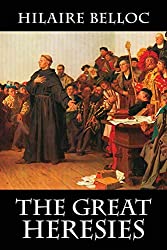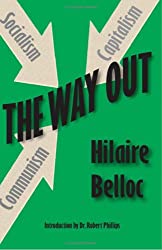
Much of the writing that occupies Economics for Helen is hardly original thinking – but it is inspired writing.
Let me explain.
Hilaire Belloc was prolific – very prolific, chalking up over 150 books in his lifetime. It is hardly surprising that not everyone of them achieved the same standard. Indeed, Belloc referred to much of his writing as ‘detestable hackwork’, churned out simply to make a living.
No doubt he was being too harsh on those volumes. Many people praise them highly indeed.
Still, Belloc’s self-condemnation reveals something important – that beyond his so-called hackwork, there was a core of books where Belloc cared – evidently cared very deeply – about what he wrote. He did not write to stave off the wolf at his door – he wrote for love.
Indeed, one could say – he wrote for love of humanity.
Economics for Helen clearly belongs to this core of books, written purely for his ideals.
And this is what makes Economics for Helen beautiful – even though, again, much of its contents is indeed common, not original. For here Belloc has aspired to give the layman a primer in economics.
He therefore is simply laying out ideas one might easily find in a hundred other economic textbooks. He explains then, very basic ideas – such as what land, labour and capital really mean. Or what things like the margin of production or economic rent are.
Even if much of the content is not innovative, then, nonetheless the way Belloc treats that content is rich and rewarding. He cared to give the layman a clear, concrete understanding of terms that are all-too-often drowned in abstractions.
And he cared because he saw that economic science was essentially amoral. In itself, it was neither good, nor bad.
From Roger Buck, co-author of this site. Click to buy from Amazon worldwide!

But because it could be used by immoral people to cause suffering – on an immense, terrible scale – it was necessary, therefore, that moral people understand and work with economics.
And so Belloc undertakes to educate the layman about the very basics of economics.
He has educated me. Moreover, he has fed my soul in the process.
I must only add that not all the book is like I said. For given the crying need to inject morality into economics, Belloc does exactly that at various turns.
Here the book moves away, then, from its stated goal of a layman’s introduction and begins to explain the moral philosophy behind Distributism (Belloc’s search for a third way beyond Capitalism and Socialism, wherein wealth would be distributed as widely and morally as possible).
For example, Belloc takes pains to explain why Usury – as interest on an unproductive loan – is a moral monstrosity (whereas interest on a productive loan is something entirely different).
He explains then, if I have oil in the ground, but need funds to recover it, there is no moral reason why the bank should not also profit from my oil extraction. This is because both the bank and myself are producing wealth – turning raw material into something human beings can actually use.
This, then, is a productive loan. But Belloc clarifies why so much bank lending is unproductive:
Suppose a man to come to you if you were a baker and say: ‘Lend me half a dozen loaves. My family have no bread and I cannot see my way to earning anything for a day or two. But when I begin to earn I will get another half dozen loaves and see that you are not out of pocket.’
Then if you were to reply: ‘I will not let you have half a dozen loaves on those terms. I will let you owe me the bread for a month if you like, but at the end of the month you must give me back seven loaves”: that would be usury.
The man is not using the loan productively: he is consuming the loaves immediately. No more wealth is created by the act. The world is not the richer, nor are you the richer, nor is society in general the richer.
No more wealth at all has appeared through the transaction. Therefore the extra loaf that you are claiming is claimed out of nothing.
It has to come out of the wealth of the community – in this particular case out of the wealth of the man who borrowed the loaves – instead of coming out of an increment or excess or new wealth. That is why usury is called ‘usury’ – which means: ‘wearing down’, ‘gradually dilapidating’.
It is clear that if the whole world practised usury and nothing but usury, if wealth were never lent to be used productively, but only to be consumed unproductively, and yet were to demand interest on the unproductive transaction, then the wealth that was lent would soon eat up all the other wealth in the community until you came to a situation in which there was no more to take.
Everyone would be ruined except those who lent; then these, having no more blood to suck, would die themselves, and society would end …
It matters not in the least whether the actual thing, the loaves of bread, are lent, or money is lent with which to buy them. The test is whether the loan is productive or not.
The intention of Usury is present when the money is lent at interest on what the lender KNOWS will be an unproductive purpose, and the actual practice of usury is present when the loan, having as a fact been used unproductively, interest is none the less demanded [Belloc’s emphasis]
The proof that this feeling about usury is right is to be found in the private conduct of individuals in their social relations.
If a poor man in distress goes to a rich friend and borrows ten pounds, he pays it back when he can; and the rich man would think it dishonourable to charge interest. But if a man borrowed ten pounds of one for the purpose of doing something which was likely to increase its value, and we knew that this was his purpose, we should have a perfect right to share the results with him, and no one would think the claim dishonorable.
Usury, then, is essentially a claim to increment, or extra wealth, which is not there to be claimed.
It is a practice which diminishes the capital wealth of the needy and eats it up to the profit of the lender – so that, if Usury go unchecked, it must end in the absorption of all private property into the hands of a few money brokers.
Belloc wrote this book around 1923. Today, our economics would seem further removed from his moral vision than ever. His Distributism would seem all-but-impossible.
Yet this is no excuse to surrender a moral vision or to stop thinking morally about economics. This book very much deserves to be read today.
But having recently spoken about Hilaire Belloc at great length recently, I shall endeavour to keep this review short (and I hope sweet).
We shall only add that this IHS Press edition beautifully supplements Belloc’s original text in some fine ways. There are several very helpful prefaces from the directors at IHS Press as well as Alberto Piedra and Edward A. Mc Phail. The book also features beautiful old illustrations, richly evocative of the rural and traditional life Belloc sought to preserve.
One can find other editions of Economics for Helen – but I particularly recommend this edition from IHS Press for the evident love with which they have sought to re-present Belloc to the world.
Foreword for Monarchy by Roger Buck








Comments
comments are currently closed
One response to “Hilaire Belloc: Economics for Helen (Review)”
[…] partly because, so far, our reviews of Belloc’s books, such as Survivals and New Arrivals or Economics for Helen have been relatively […]